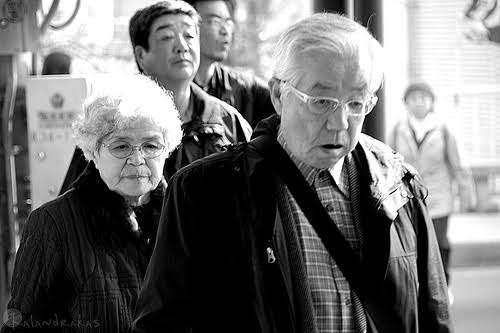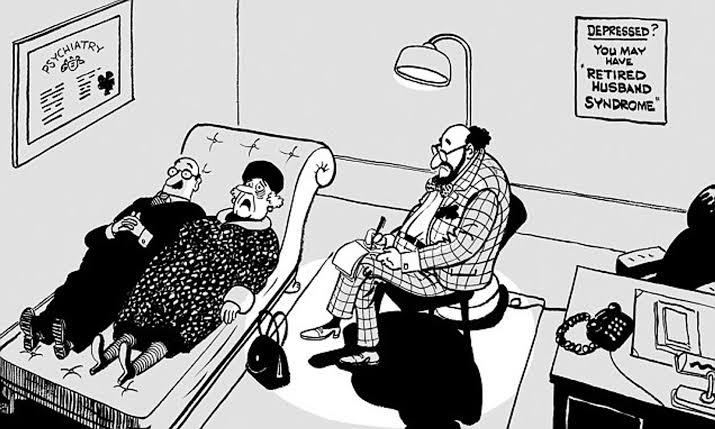A random google search led me to the term ‘Retired Husband Syndrome’. At first it seemed made up to me, so I checked and found out that it’s a topic of national concern in Japan, where 60% of women have reported extraordinary impact on their mental and physical health because of their husband’s retirement.

Similar conversations have started in the west too. Coming from a country where ‘mental health’ is still a taboo word, the Retired Husband Syndrome all seemed surreal to me. But then I started observing the neighbourhood and tried to analyse it in Indian context.
What Happens To The Wives When Men Retire?
The ‘Man’ of an average Indian middle class family works hard to feed, ‘protect’ and enrich his family till he retires from the job. His office arranges a nice farewell to felicitate him. He gets congratulatory greetings and gifts; the colleagues wish him the best with the ‘second innings’, gift him shopping coupons or holiday package for the family or sometimes they even invite his family. The retired man with happy tears, returns home to the surprise party arranged by his family with relatives and friends. The day ends well.
I attended a few of these functions recently, and realised that while the beloved retired human enjoys his entry to the bliss of retirement, his wife is the one who wipes the sweat-beads off her face, dealing directly or indirectly with all the tasks from arranging the party, to cleaning up in the end; all the while contemplating over how the actual roller-coaster will start from the next day. Few of the standard comments and queries the wife has to hear are, ‘Now that your husband has retired, you can finally enjoy and rest! (mostly from men or younger women who are yet to experience this)’ or ‘How does it feel like to be the retired-couple?’.
And to these questions, the standard response by the wife is ‘(awkward laugh) you know, mine is a 24/7 never ending job. Men may retire whenever they want but we can never!’ And sadly, it’s true. Indian family system is so abusive that many of us don’t even realise how unfair and draining it is to be the woman of the house.
And to these questions, the standard response by the wife is ‘(awkward laugh) you know, mine is a 24/7 never ending job. Men may retire whenever they want but we can never!’ And sadly, it’s true. Indian family system is so abusive that many of us don’t even realise how unfair and draining it is to be the woman of the house.
In many of the families, the wife with or without an outdoor job, has to bear the weight of all the emotional and physical labour needed to run the family on her shoulders. The husband is practically absent from almost all the familial activities and opportunities of familial bonding. She attends PTMs in her child’s school, maintains relationships with relatives and family friends, is expected to be the unpaid attendant or event manager in husband’s party or gatherings, care for everyone’s illness, appointments and grooming, manage monthly expenses and countless other things we don’t even realise or care to acknowledge.
More Consequences
For almost 25-30 years of her married life, the “wife” falls into a routine and develops her own way of dealing with things. Sometimes it works and sometimes it doesn’t. But throughout this journey, she is all alone. Yet, one day her husband gets retired and stays at home everyday and becomes a home version of Intelligence Bureau. He has to meddle in every single thing she does and needs a report on everything that happens to the family members. Most of them are just lost because they don’t have anything to invest their time in, mainly because of lack of imagination or emotional intelligence that’s required to create a social space for themselves apart from work, or because they were ‘married’ to their work and mistook work for life and the work-colleagues for friends.

Along the lines of social hierarchy, the men from a socially backward background, have a very limited access to or a less welcoming experience in the social spaces meant for retired/old population. Therefore, many times their social relations extend to their own community only and it so happens that because of a general lack of privilege in their community, the probability of finding acquaintances with similar shareable experiences/lines of work is very low, leaving them with another layer of isolation and insecurity.
But quite generally, men can’t stand the idea that the wife can have her own personal space meant just for herself. One of my mother’s friends was complaining the other day, that she can’t even read a book of her choice after her husband’s retirement
But quite generally, men can’t stand the idea that the wife can have her own personal space meant just for herself. One of my mother’s friends was complaining the other day, that she can’t even read a book of her choice after her husband’s retirement; he keeps interrupting her and makes her read a part of the book that he was reading. Later, I overheard a conversation in the train, where the girl was saying, ‘I can’t even imagine how my father’s retirement would be like.. It’d almost be like do maa-beti ke beech mein koi teesra aa gaya! (It’s almost as if the father would be playing gooseberry with the mother and daughter)”
Also read: Unpaid Domestic Labour And The Invisibilisation Of Women’s Work
Analysing Retired Husband Syndrome
Due to the lack of understanding of other family members’s space and sometimes, because the kids interact with the mother more, since men don’t make much of an effort, many of them start feeling unnecessarily insecure after retirement, and try to ‘re’gain control of the family. Obviously, this is because the society never lets boys and men invest in learning a language other than control.

This involves berating the wife for not having made a disciplined family routine (according to him), emotionally bullying everyone in the family for doing anything that makes him feel useless due to retirement, or something quite opposite as taking responsibility for some household tasks. But, since men tend to be patronizing they don’t actually feel the need to learn first or ask for help and they end up with a mess which is ultimately sorted by the wife. Along with her own children she has to handle the ‘manchild’ of a husband too. Some of them acknowledge the fact that they can’t function properly without their wives, while some have the audacity to count and recount every expense they made for the family.
since men tend to be patronizing they don’t actually feel the need to learn first or ask for help and they end up with a mess which is ultimately sorted by the wife. Along with her own children she has to handle the ‘manchild’ of a husband too.
Those with grandchildren have another different set of problems. In the beginning, the grand-parents happily take the responsibility of the grand-kids, but the major responsibility falls on the grandma again. No one really realizes that she is a human being and she does get older with time, unlike machines. I see a lot of old men chattering in gardens and parks about their sons, daughters, insurance policies, politics and some bring their grand-children for an evening play, some do their yoga. Very few women go out and do these things, the rest don’t even get the time to tend to themselves.
Coming back to Retired Husband Syndrome, I believe more research needs to be done on the ground of the socio-psychological environment in India. The women in the West and even Japan, to some extent, have started concluding the marriage with a divorce. But in a country like India, where the husband is a deity, divorce is not a very popular choice even among the younger couples; so if an old couple seeks divorce, they’ll surely be laughed upon with ‘is umr mein divorce lekar kahaan jaana hai?’ (where are you going to go after getting divorce in this old age?).
Also read: In Photos: Women At Work – The Many Facets Of Women’s Labour
When it’s a collective problem, divorce cannot be a permanent solution, because men don’t even realize how they are a part of the problem even if it is quite evident that their retirement is an event that disturbs the familial balance. Even if they do realize, they don’t feel the need to make any efforts to change it because Indian society always expects the wife to be ‘content’ and ‘happy’ to serve the husband and family in whichever way possible and never utter a word of complaint. It’s a long journey of unlearning and relearning.
References
- Japan retired divorce rate soars: BBC
- Retired husband syndrome: BBC
- Retired husband syndrome – why wives get depressed when their other halves stop working: The Telegraph
Featured Image Source: LOLWOT
About the author(s)
Mudita Sonawane studies Physics, Hindustani classical music and government policies. She has represented University of Mumbai in the 9th South Asian Universities Festival. She is an avid observer of politics and takes an interest in Photography and painting as well.




